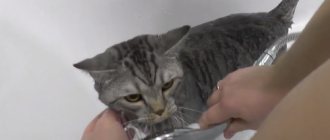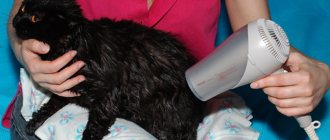7986Pavel
Cat owners sometimes wonder whether it is possible to bathe a pregnant cat at home. In principle, pregnant cats can lick their fur with their own tongue, thereby replacing your decision to wash it. Considering this and the fact that the sebaceous glands of cats secrete useful and necessary substances, there is no need to wash your beauties of any breed, for example, the Sphynx, too often.
There is no exact answer to this question, but the decision to bathe a pregnant animal does not have any negative consequences.
The nuances of this procedure:
- It is necessary to wash a pregnant cat only if there is a danger of harmful substances entering her body during washing.
- wash it very carefully, as any damage can have a detrimental effect on it;
- To prevent small particles of the detergent from getting inside the body during bathing, you should sometimes replace the cat shampoo with dry scrubs prepared at home. For the base of such scrubs they use oatmeal, starch and powder for small children. Remember that chemicals can ruin a mother's lactation after childbirth.
© shutterstock
Why is bathing undesirable if the cat is pregnant?
Pregnancy has no contraindications as far as hygiene procedures are concerned.
But it is considered undesirable to wash an animal’s fur using shampoo. The product contains many components of chemical origin, including toxic ones. The owners are worried about the future offspring, because the cat can harm the kittens when licking its own fur. But if the cat is accustomed to bathing and the smell of shampoos, then you can wash the animal. If contact with water causes negative emotions in her, then rinsing the wool should be done as carefully as possible. There is no need to make sudden movements, hold the pet by the withers or place it in a bathtub in which the water level is higher than the cat itself.
It is worth washing a pet only in cases where the use of other hygiene products does not make sense. It is important to take into account the physical condition of the animal and its well-being.
Under no circumstances should you bathe a cat that is having a difficult pregnancy, especially if it is several weeks pregnant. It is worth remembering that not all animals tolerate water procedures easily; for some of them it is a lot of stress.
When swimming, you should follow a number of rules that can simplify the procedure:
- The water temperature should be comfortable for the animal. It is necessary to ensure that the water is not too hot or cold. Otherwise, the pet will catch a cold, and during pregnancy this is very dangerous.
- If the cat does not need to wash its entire body, then you should not soap it entirely. The cat's paws are dirty after a walk - only the fur and toe pads should be washed.
- Shampoos should not be used unless absolutely necessary. If your pet has fleas, then it is more rational to purchase special capsules or a collar that will help remove the parasites. There are also dry shampoos and sprays that do not require contact with water.
Under no circumstances should you bathe a cat that is having a difficult pregnancy, especially if it is several weeks pregnant. It is worth remembering that not all animals tolerate water procedures easily; for some of them it is a lot of stress.
Should I wash my pregnant cat?
Veterinarians answer this question in the negative, firstly, because of possible complications with the pet’s health, and secondly, because the risk of injury during bathing increases, because the animal becomes clumsy and can unsuccessfully jump out of the bath or slip on wet water. surface and fall.
A pregnant cat can be washed only if it is dirty and when the animal licks its fur, dirt undesirable for its health can get into the stomach. This rule also applies when the owner uses all kinds of shampoos while bathing a pregnant cat, which can subsequently harm unborn babies. Experienced cat owners resort to dry brushing of fur.
Care
When thinking about whether it is worth carrying out such a process, look for information about other methods of care that will be more suitable for the lady. For example, you can simply take your animal to a professional veterinarian, who will examine her and clean her fur of fleas. At the same time, it will not harm the kitten, which is in the womb. Also, if you wish, you can consult a doctor about possible and safe ways to care for your animal.
To properly care for your pregnant pet, you need good food and fresh water. The toilet should be as clean as possible. If for some reason you cannot avoid washing, then try to do it as correctly as possible.
How to properly care for an animal's fur?
Caring for a pregnant cat is not difficult, but it is worth remembering some nuances:
- Do not wash your cat's fur with cosmetics intended for humans. Such bathing will negatively affect the animal’s well-being. The cat licks its fur and at the same time is able to swallow the remains of the shampoo. The composition of products for animals or for humans is very different, this can affect the condition of the pet’s skin and coat.
- When drawing water into a bathtub or basin, it is worth considering the height of the pet. It is advisable that the fluid level reaches the abdomen. A pregnant cat should be washed carefully, distributing the soap base with massage movements. The shampoo should be rinsed thoroughly, changing the water several times.
- After bathing, the animal is wrapped in a towel. You should not let her go with wet fur, as she may get sick. If your pet is not afraid of a hair dryer, then you should use it. If it is afraid, then you need to hold the animal wrapped in a towel in your arms for at least a few minutes - until the fabric absorbs excess liquid.
During bathing, it is necessary to calm the cat so that it feels more comfortable. It is worth petting it, scratching it behind the ear - this way the animal will understand that the owner will not do anything wrong and you can trust him.
All representatives of the cat family are very clean creatures. Keeping a domestic cat is a pleasant and generally not burdensome task. If a dog needs water treatments regularly, then it is not necessary to bathe a cat. Nevertheless, many owners of furry purrs consider this item of animal hygiene mandatory.
Veterinarians' opinion
There is no clear answer to the question of whether it is possible to bathe a cat during pregnancy. Veterinarians agree that if an animal has been accustomed to grooming and water procedures since childhood and tolerates them calmly, then pregnancy is not a contraindication for bathing.
If the cat is absolutely healthy and the pregnancy is proceeding normally, the usual hygiene routine does not need to be changed. It is also not prohibited to use shampoos and soaps with one or another therapeutic and prophylactic effect.
It’s a completely different matter if the condition of the pregnant cat is unsatisfactory. Toxicosis, digestive disorders, irritability, signs of malaise are a direct contraindication to swimming.
There is no need to subject the weakened animal’s body to additional tests during this difficult period. Each such procedure for a cat becomes a severe physiological and psychological stress. This is especially true for those whose immune system is already weakened as a result of selection and many years of inbreeding. In this case, we are not talking about the use of chemical detergents at all.
If a cat goes out for a walk, there is always a risk of catching some unpleasant disease, getting fleas, or simply getting dirty. In this case, pregnant cats will still have to be bought. However, you need to do everything possible to keep the stress low.
We invite you to read: Vaseline oil for cats with constipation: indications and contraindications, instructions for use
As an alternative solution, you can maintain your cat's hygiene with dry shampoos during pregnancy. You can buy them at any veterinary pharmacy or pet store.
Do cats need bathing? The answer to this question among owners of meowing pets has completely opposite opinions. On the one hand, cats manage hygiene issues perfectly themselves, carefully licking themselves with their rough tongue.
Moreover, any water procedures for mustachioed striped animals are a stressful situation, and there is no need to talk about the owner who has been attacked by a frightened wet animal. On the other hand, purring owners believe that by washing their pet, they only bring him benefit. In any case, there are situations in life when thorough washing is simply necessary for health and well-being.
FAQ
Let's look at the main features of how to wash a cat at home.
How to bathe a kitten?
We'll tell you how to wash a kitten. When the kitten is a few months old, begin to accustom him to the sound of water and try to get him to go into the bath often. Run a thin stream of water from the tap and show it to the kitten while holding it in your arms. Maybe he'll see it as a new game and won't be too afraid. The noise of the water can be frightening, and the kitten will refuse to wash itself. Do not insist or hit your pet. He will be even more scared.
Here is a step-by-step algorithm for how to bathe a kitten for the first time:
- The procedure is best performed on a warm day in summer or spring. Then the baby will not catch a cold.
- Before bathing, check to see if your pet has scratches, wounds or scratches.
- It is better to choose the moment when the kitten is tired - then it will be easier for the owner.
- The bath is too big and can be intimidating. Bathe your baby in a sink or basin.
- Before bathing, play with your kitten to distract it.
- Wash him with a special shampoo for small kittens.
- You can dry it only with a towel, without a hair dryer.
It is better to trim the cat’s claws a few days before the procedure.
Is it possible to bathe a pregnant cat?
If your cat is pregnant, you should not bathe her until she gives birth. The procedure also cannot be performed immediately after childbirth; it is better to wait a few weeks. Bathing is permissible only in the early stages of pregnancy, and provided that the pet is calm about water.
Is it possible to dry fur with a hairdryer?
Blow-drying is acceptable, but it also needs to be done gradually. The main condition is that the pet is not afraid. Don't dry it with a hairdryer right away; first, just turn on the device at low power. When the animal adapts and gets used to it, slowly direct the air in its direction.
How to wash a cat who is afraid of water?
It is not necessary to wash your cat with water. Wiping with wet wipes or dry shampoos are suitable. The products are diluted according to the instructions on the packaging. If the animal has short hair, dry bran baths will be very helpful.
How to wash a cat so that it doesn't scratch?
To prevent your pet from scratching, trim its nails 2-3 days before bathing. The procedure can be performed either in a veterinary clinic or at home. Another option is to put on special claw covers.
Will human shampoo work?
Owners ask: “Is it possible to properly bathe a cat with ordinary human hair shampoo?” You need to buy a special one for cats so that your pet does not develop skin allergies and does not feel worse.
Soap will make the skin dry, the coat will stop shining, and dandruff will appear.
Types of cat shampoos you can use to wash your pet
In order to wash a pregnant cat with shampoo at home, choose the type that will not harm your star’s body. Below you can see examples of such products that you can use to wash your animal.
- With liquid shampoos, washing will be easy and simple. If you have a chance to buy an imported product, take it, since the domestic product has proven itself a little worse in this regard. Such shampoos cannot be used more than 3 times a year.
- Dry shampoos. They are used if animals are afraid of water, and you want to wash it. The problem with using such shampoos is that some violent animals simply do not allow the shampoo to be combed out of their fur. This is typical for long-haired cats. Dry shampoo may contain substances that make combing much easier.
- Special shampoos. They are completely identical in their functions to dry shampoos, but are much more convenient to use. They also additionally have a pleasant scent that you can choose any day.
In order to wash a pregnant cat with shampoo at home, choose the type that will not harm your star’s body. Below you can see examples of such products that you can use to wash your animal.
- With liquid shampoos, washing will be easy and simple. If you have a chance to buy an imported product, take it, since the domestic product has proven itself a little worse in this regard. Such shampoos cannot be used more than 3 times a year.
- Dry shampoos. They are used if animals are afraid of water, and you want to wash it. The problem with using such shampoos is that some violent animals simply do not allow the shampoo to be combed out of their fur. This is typical for long-haired cats. Dry shampoo may contain substances that make combing much easier.
- Special shampoos. They are completely identical in their functions to dry shampoos, but are much more convenient to use. They also additionally have a pleasant scent that you can choose any day.
Why is bathing necessary at all?
Bathing is not an easy task, washing the paws after a walk outside, or when they become heavily clogged.
The process involves completely immersing the cat in water, and this is done in the following cases:
- for prevention;
- if there are fleas;
- a thick layer of dirt has formed on the fur.
Long-haired pets should be bathed more often, exclusively before exhibition days. Owners often ask whether it is allowed to bathe a pregnant cat?
There is no clear answer to this question. In general, pregnancy has no contraindications to swimming.
But, it is necessary to take into account a number of nuances:
- It is recommended to wash cats indoors only if there is a threat of some harmful or toxic substances entering its stomach;
- Even the tiniest trauma can affect children, and their psyche in particular;
- To ensure that any remaining shampoo that enters the animal’s digestive system does not harm future babies, it is often possible to replace ordinary cat shampoo with homemade dry scrubs. They are based on oatmeal, starch and baby powder. Chemistry can ruin subsequent lactation after birth.
When deciding whether it is permissible to bathe a pregnant cat in water without violence, keep in mind that the result will be as follows: it is still better to shift attention to other methods of care. Let's say your pet needs to be taken to the veterinarian periodically.
He must examine her for the presence of worms, which can harm babies. You also need to make sure there are no fleas. If they are, then ask about a non-hazardous way to get rid of them.
A proper diet and the presence of fresh water are of great importance for health. The cat's litter box must be clean, and consistently. However, if for significant reasons bathing is irreversible, it is necessary to do everything possible to ensure that this process goes smoothly and painlessly.
How to choose shampoo for a cat
Due to the different acid-base balance between humans and animals, there is no need to use soap products that people use. This can injure their skin and damage their fur.
The following cat shampoos are used:
- Liquid. They contain a high flushing efficiency. They are available for various purposes, they wash away dirt perfectly, and the wool becomes nice to the touch. In all likelihood, it is worth using the imported, more precious, option. But domestic shampoos are not much inferior in quality. It is impossible to use all of them more often than 3 times a year, as this disrupts the sebum balance;
- Dry ones are an easy solution when your pet has a panic attack about water. The difficulty of using them is that some animals do not allow detergent to be combed out of their wool. This procedure is especially difficult for long-haired cats. Remember that a good shampoo contains substances that have an effect similar to a balm that makes combing easier. It is also canceled in that it is suitable for frequent use, it is safely allowed to wash a cat’s hair, and it is suitable for bathing before exhibitions;
- Sprays. They have the same functionality as dry shampoos, but are more comfortable to use. In addition, they have a perfume scent and antistatic protection.
Instructions: how to bathe correctly
This is a very careful animal. A pregnant cat, unlike others, can easily guess what events await her in the future. In order to somehow wrap your pet around your finger and wash it, you can simply not open the bottle of shampoo in front of it. She may be more afraid not of the water itself, but of the noise it makes when flowing from a tap or splashing in another container.
Where to begin
In order to bathe a female, you need to prepare one free container for bathing and another for rinsing. It will be better if you bathe your pregnant cat in the bathtub. In this case, her great love of freedom will not interfere with the careful process of bathing pregnant cats at home. Also remember that the water level should be up to your belly.
At the very beginning of the process, just before bathing the cat at home, you cannot immediately lower the female into the aquatic environment. To calm the animal, pet it, calm it down and then carefully place it in a container of water. Lightly wet the animal's fur while holding the pregnant cat tightly in your hands.
Drying
The logical result of this entire washing procedure will be ordinary drying, during which the pet is usually wrapped in a comfortable towel, soaking the wet fur with it. If such an animal is not afraid of the sound of a hair dryer, then the drying time after washing can be greatly accelerated. The main thing is that your pet does not suffer from cold after the procedure is completed.
This is all that is required from you to ensure that your big animal is absolutely happy. Don't be surprised if your pregnant female is in poor condition after you give her a bath. In exactly a couple of hours, not a trace of this stress will remain, and your furry happiness will again be the same as before.
Toxoplasmosis can be contracted directly from a cat by cleaning its litter box, eating contaminated foods, or rarely by inhaling air contaminated with toxoplasma.
It is quite difficult to recognize the symptoms of toxoplasmosis, because most often the disease is asymptomatic or is expressed in increased fatigue, a slight increase in temperature, headache, enlarged lymph nodes, which can be confused with a common cold.
How to protect yourself?
Toxoplasmosis occurs once in a lifetime. That is why, when planning a pregnancy, it is worth taking a blood test and determining whether there are proteins (antibodies) that indicate toxoplasmosis in the body. It happens that a woman, without noticing it, was once ill. In this case, she has immunity and can no longer become infected.
If you have the opportunity, assign members of your household to clean up the cat's litter box. Wipe down the dining table thoroughly before eating.
We invite you to read: How old is your cat by human standards and what affects its life expectancy
Before cutting raw meat, be sure to wear gloves and never taste raw minced meat. The meat you eat must be completely cooked (Toxoplasma is killed by heat treatment).
Not all. Any cat walking on its own is at risk of infection. Toxoplasma enters the animal's body through raw lamb and pork, caught birds and rodents. If your cat does not go outside and does not spend the summer season in the countryside, most likely, she is not infected. However, at the stage of pregnancy planning, it would not be superfluous to show the animal to a veterinarian and undergo the necessary tests to make sure that your cat is healthy.
Drying
Cats are one of the most popular pets in Russia, America and many other countries, along with dogs. Cats are affectionate, affectionate little creatures and, when young and healthy, require very little care. Cat owners have another advantage - their pets can have kittens!
First, you should take your cat to the vet. Just as a pregnant woman needs good medical care, pets require specialist supervision, and cats are no exception. If your cat has never been to the vet before, now is the time to visit for the first time. Don't delay this event; your pregnant cat should be examined as soon as you know she is pregnant.
The third issue to consider is your cat's diet. Now food is necessary not only for her, but also for her future kittens. You will notice that your cat is eating more than usual as her pregnancy progresses. During late pregnancy, add special kitten food to her regular food.
The fourth tip that will help ensure your pet has a normal pregnancy and ensure the birth of healthy kittens is to increase the amount of water she drinks. Keep her water bowl clean and change the water every day.
The fifth tip is to keep her toilet clean. The litter box will smell a little stronger when your cat is pregnant. To get rid of the smell, add baking soda to your litter. If your cat spends a lot of time outside or is indoors most of the time but goes outside for her natural needs, provide her with a litter box at home and make sure she knows where it is.
The sixth tip to help you take care of your cat when she's pregnant is to spend more time with her. Cats are very loving. And they love to be loved too. You will probably notice how your cat's mood changes.
The seventh tip I can give you is to keep your pregnant cat clean. Of course, bathing your cat with shampoo is not a good idea. Instead, always keep a clean fur brush handy and use it as intended as often as possible. If you feel that your cat still needs to be bathed, consult your veterinarian first. Make sure the shampoo you use is safe and suitable for pregnant and lactating cats.
The eighth tip you need to learn is that your cat should not have fleas. A cat with a lot of fleas may not be happy or healthy. In this case, a flea collar can help, as can flea ointment. But, I repeat, first consult a veterinarian, he will definitely tell you a safe and effective remedy for fleas.
Tip Nine: Help your cat find a place where she will give birth. Fill a wide but relatively shallow box with soft cloth. You can use an old blanket or sheet for this purpose. Find a secluded place where the expectant mother and her kittens will feel calm and safe. If you live in a cold climate, make sure your birth area is well insulated.
The last, tenth thing you can do is help your pet during the birth process. You will understand when the time is right. When your cat begins to push, she will scream and meow in pain. At this moment, she probably won’t want to be disturbed. Stay nearby, but give her plenty of space and privacy.
Provide your pregnant cat with support and love and you will have beautiful, healthy kittens!
Pregnant animals need special care, including hair care. A cat, while licking its body, can swallow the remaining shampoo, which ends up in the digestive system. In addition, bathing is a lot of stress, which is undesirable for a cat that will soon give birth to offspring. But sometimes washing cannot be avoided: if the animal has fleas or the fur is matted with dirt after a walk. In such cases, other hygiene products are used.
Where to begin
In order to bathe a female, you need to prepare one free container for bathing and another for rinsing. It will be better if you bathe your pregnant cat in the bathtub. In this case, her great love of freedom will not interfere with the careful process of bathing pregnant cats at home. Also remember that the water level should be up to your belly.
Drying
Other means
The following brands of flea drops work well for treating pregnant and lactating cats:
- Advantage (Advantage) 40. The active ingredient is imidacloprid, it protects mother and babies, as it has an “umbrella effect”. Apply to the skin between the shoulder blades so that the cat cannot lick the drug.
- Frontline Combo. The active substances are fipronil and S-methoprene, applied to the withers. The drug is fast-acting with a long-lasting effect.
- Beaphar (Beafar) - drops against fleas and ticks. A natural preparation based on an extract from the Neem (Margosa) tree. It has no contraindications, with the exception of an allergic reaction.
Tablets and injections are a last resort in case of severe infection, which can only be used in a veterinary clinic under the supervision of doctors.
Traditional methods are good for prevention, since their effectiveness is negligible. But to calm down, you can make a decoction of nettle, eucalyptus, lavender, tansy and spray it on a pregnant cat, this will repel fleas from her for a while.
When the kittens reach 3 to 4 weeks of age and can go without food for several hours, the cat can be removed and treated with an insecticide that quickly absorbs into the skin, killing fleas. In this case, they will not harm the babies and the nursing cat itself.
Baby
When treating an animal, you must not forget about treating the pet’s area, in which insect eggs and larvae may remain. If it is winter outside, then it is advisable to take the bedding and the house out into the cold for a while.
For prevention, you can place a bag of eucalyptus or fragrant herbs next to the bed:
- wormwood;
- lavender;
- tansy.
How to recognize pregnancy
During bathing, the shedding process accelerates, as washing the coat with shampoo and water removes dead hairs. True, many short-haired breeds, for example, some Siamese cats, Orientals and Rexes, lose a lot of hair during shedding and even sometimes have bald spots on their sides, so it is better not to bathe some breeds during shedding.
We suggest you read: What to do when a cat gives birth for the first time
Bathing for many meowing pets is an unpleasant, stressful procedure, and if the animal is sick, then bathing it, of course, is not advisable. Drafts can also seriously damage an organism that is still fragile after illness, and during vaccination or quarantine, washing cats by veterinarians is generally strictly prohibited.
The gestation period for almost all cat breeds is about 9 weeks. However, this period may be longer or shorter by approximately 7 days. And that's quite normal. During the first few weeks of pregnancy, your cat begins to eat less. Sometimes this condition is accompanied by short-term vomiting and apathy of the animal. After about a month, the cat's nipples turn pink. After a month and a half, embryos are already palpable.
To do this, you need to very gently press on the abdominal cavity. At 6 weeks, the cat's abdomen rapidly increases in size, and the embryos can no longer be palpated individually. Only after 7 weeks can you feel the kittens. Cats at this time begin to behave very restlessly and look for a place to give birth.
In the first month of pregnancy, the cat’s diet does not need to change much. But it wouldn’t hurt to add foods high in calcium, protein and vitamins to your diet. For this you can use special feed. After a month, you can introduce food rich in protein into your pet’s diet.
In the middle of pregnancy, veterinarians recommend starting to feed the animal more often than usual. But there is no need to increase the portions. The cat must not be allowed to gain much weight, otherwise the kittens will be large and the birth will be very difficult. Cats usually lose their appetite a few weeks before giving birth, so there is no need to be alarmed.
If the cat is fed only natural products, the majority of its diet during pregnancy should be meat. And it should only be boiled. In addition, the cat needs fish, boiled eggs, cereals, dairy products and vegetables. In this case, it is necessary to add special supplements containing vitamins and minerals to the diet.
Your cat also needs to drink a lot, so she should always have access to clean, fresh water. You can give your cat a special decoction of raspberry leaves, which is prepared as follows - 1 tsp. leaves are poured with a glass of boiled water. Just before giving birth, the animal can be given nettle leaves. They are poured with boiling water and fed to the cat after cooling. This helps the milk flow.
Pet health
You cannot give the animal even the safest medications during this period. The only thing veterinarians allow are probiotics. Dangerous symptoms during cat pregnancy include high fever, bloody or purulent discharge, lethargy and exhaustion.
During pregnancy, your cat may go into heat. This usually occurs approximately 20 to 25 days after fertilization. During this period, the animal may begin to ask to see cats and behave inappropriately. Often such cats mate with male cats and can become pregnant again. These kittens are born several weeks apart. But there is a great danger that during the “first” birth a miscarriage may occur. Therefore, it is better not to allow this to happen.
Miscarriage can also happen due to poor nutrition, any injury, infection, hypothermia or overheating. If this happens, the cat needs to be taken to the vet immediately. In healthy cats, pregnancy and birth are easy. But the owners still need to carefully monitor the condition of their pet and help her in time.
It is normal for a cat to have a drop in temperature before giving birth. But its increase indicates that the inflammatory process has begun. And after giving birth, it is best to leave the cat with newborn kittens alone. It is necessary to place a tray and a bowl of food near the box so that the animal is not separated from the babies.
How often to bathe
For pets who live in an apartment and do not go outside for walks, it is enough to wash them only once every three months, however, no one has canceled the combing of the pet by the owner. Animals that go for walks, especially if there is a road near the house, need to be bathed at least once every two months; in rural areas, even a free-roaming cat can be washed only three times a year.
You cannot bathe your cat often, as the natural fat layer is washed off, without which the quality of the coat deteriorates, the skin becomes dry, and dermatitis appears.










